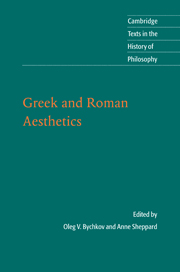Book contents
- Frontmatter
- Contents
- Preface
- Introduction
- Chronology
- Further reading
- Note on the texts and the translations
- Greek and Roman Aesthetics
- Gorgias
- Plato
- Xenophon
- Aristotle
- Philodemus
- Cicero
- Seneca
- Longinus
- Philostratus
- Philostratus the Younger
- Aristides Quintilianus
- Plotinus
- Augustine
- Proclus
- Index
- CAMBRIDGE TEXTS IN THE HISTORY OF PHILOSOPHY
Longinus
Published online by Cambridge University Press: 05 June 2012
- Frontmatter
- Contents
- Preface
- Introduction
- Chronology
- Further reading
- Note on the texts and the translations
- Greek and Roman Aesthetics
- Gorgias
- Plato
- Xenophon
- Aristotle
- Philodemus
- Cicero
- Seneca
- Longinus
- Philostratus
- Philostratus the Younger
- Aristides Quintilianus
- Plotinus
- Augustine
- Proclus
- Index
- CAMBRIDGE TEXTS IN THE HISTORY OF PHILOSOPHY
Summary
On Sublimity
1–2
My dear Postumius Terentianus,
You will recall that when we were reading together Caecilius' monograph On Sublimity, we felt that it was inadequate to its high subject, and failed to touch the essential points. Nor indeed did it appear to offer the reader much practical help, though this ought to be a writer's principal object. Two things are required of any textbook: first, that it should explain what its subject is; second, and more important, that it should explain how and by what methods we can achieve it. Caecilius tries at immense length to explain to us what sort of thing ‘the sublime’ is, as though we did not know; but he has somehow passed over as unnecessary the question how we can develop our nature to some degree of greatness. However, we ought perhaps not so much to blame our author for what he has left out as to commend him for his originality and enthusiasm.
You have urged me to set down a few notes on sublimity for your own use. Let us then consider whether there is anything in my observations which may be thought useful to public men. You must help me, my friend, by giving your honest opinion in detail, as both your natural candour and your friendship with me require. It was well said that what man has in common with the gods is ‘doing good and telling the truth’.
- Type
- Chapter
- Information
- Greek and Roman Aesthetics , pp. 147 - 166Publisher: Cambridge University PressPrint publication year: 2010
- 1
- Cited by

